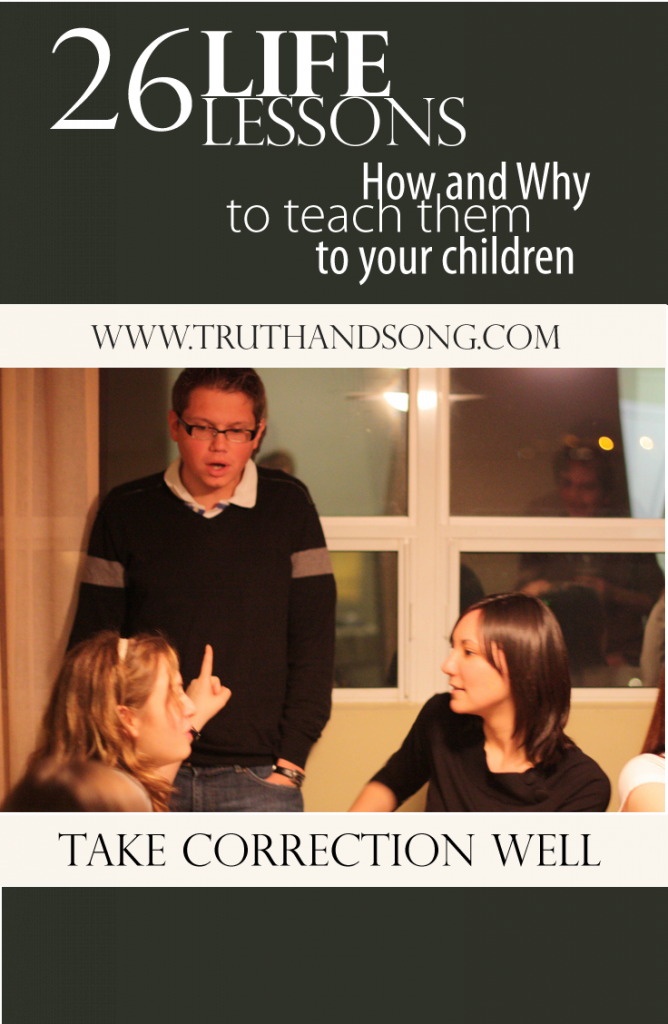
I’m going to admit one of those stories from childhood that makes me cringe every time I think of it. But first let me tell you, if I had been taught from an early age how to take correction well then many of the choices I made throughout my youth could have been different.
Here goes: I was a pastor’s daughter going to a private Christian school that was a ministry through our church. There were some wise rules of thumb that were being enforced, but they were not written in the Policy and Procedure Handbook. One teacher came up to me in between classes and nicely reminded me of this “rule of thumb” and handed me my third demerit for the day causing me to get detention.
I turned to this teacher and said …
“My dad’s the pastor. He’s your boss and you can’t give me a demerit for that. It’s not in the rulebook.”
I can begin to imagine what my dad would have done if he would have been in earshot of that remark.
OUCH!
I would like to say that I got better as I got older, but I don’t think I did.
My instinct was “Fight in public. Learn in private.” Pride controlled me.
These things that I would argue over would stick in my head and stew around and I would research them on my own. Kicking against the pricks. When I came to the conclusion that I was wrong, I was too proud to let people know that I actually came to the truth they shared. I would never bring it up again.
It wasn’t until I was in college that I started reading Proverbs regularly and saw all this stuff about a wise man. “Who was this wise man and how could I be like him?”
Fast forward about 15 (or more) years and I can tell you this. One characteristic of the wise man stated over and over throughout Proverbs is this:
The wise man is humble enough to learn from everything and everyone.
To learn and never be filled is wisdom. To teach and never be weary is love – Unknown
The wise man learns and learns and learns. (Prov 1:5)
He is never too proud to learn from his mistakes. (Prov 19:25)
A wise man will change his actions before making a mistake because he learned beforehand. (Prov 14:16)
He is able to take a reproof … and learn from it. (Prov 15:31, Prov 17:10)
He loves the man that rebukes him … because he has learned something new. (Prov 9:8, Prov 13:1)
“Every man is my teacher” may just be The Motto of the wise man. (Prov 9:9)
How do we train our children to be wise?
1. Teach them about the wise man, the foolish man, the simple man and the scorner as found throughout Proverbs. Find an outline of them here.
One of the things we noticed as a family while reading Proverbs is that there is a difference between a reproof and a rebuke. A reproof seems to be a bit lighter and serves as more of a warning to the foolish and simple. It is the wise man who heeds the reproof and becomes wiser. Yet, if the foolish and simple develop harder hearts to the reproofs of wisdom (Prov 29:1) the admonition starts coming in the form of a rebuke. How important it is to heed those first reproofs and learn from them, lest you become the scorner.
The other thing we noticed was that a rebuke did nothing for the scorner. His heart had already been hardened. From Scripture it seems that the only positive benefit of rebuking a scorner is that when it is done in public, it can help the simple man. Don’t rebuke a scorner in private. Inevitably whether done in private or public, the only thing you get from a scorner is hostility.
2. Do not train them to be the scorner.
To avoid criticism: Do nothing, Say nothing, and Be nothing. – Elbert Hubbard
No one likes to be offended. No one wants to feel unjustified. We want to be accepted. We want others to see us as good. Criticism hurts. It is judgement past upon us for our actions, motives or beliefs. We want to protect our children from being hurt.
We need to ask ourselves?
- Are we teaching them that every man can do that which is right in his own eyes? It is between them and God? (Prov 3:7, Prov 12:15, Prov 30:12, Isaiah 5:21)
- Are we teaching them that a friend that cares enough to share the truth is not really a friend after all? (Prov 27:6)
- Are we teaching our children that they don’t need to listen to the warnings of their brothers and sisters because they aren’t “the boss?” The same translates into their brothers and sisters in Christ as they grow older. No one can warn anyone or exhort or rebuke or reprove them. (Luke 17:3)
- Are we teaching our children to fear and hate correction and the corrector? (Prov 9:8, Prov 15:10, Prov 15:12)
- Are we teaching them that if anyone rebukes them should be put in his place; lashing out at those who could be their greatest teachers? (Prov 9:7, Prov 19:25)
- Are we teaching them that all rebukes must be done privately? (1 Tim 5:20)
- Are we crippling them by destroying their chance at good relationships or future productivity? (Prov 15:10, Prov 22:10, Prov 24:9)
3. Give them a plan for when correction and criticism comes.
Criticism is information that will help you grow. – Hendrie Weisenger
You heard me say this before in Act. Don’t React. Life Lesson #3, but to make wise choices in the face of emotion we need a pre-meditated plan. In fact as I was thinking about this, I started thinking about making my children booklets on “what to do when …” and giving them these basic steps. A “toolbox for life” if you will.
Let me give you an example from my home concerning a teaching moment.
One of my children has the job of sweeping the floor after every meal. I try to be gracious, but we were getting some un-welcomed little guests into our home that would heap upon the small remains and drag them back to their mounds.
During our battle against the ants I heard one child say to the other, “You know, we wouldn’t have any ants if you would sweep up the floor better.” The sweeping child lashes out, “Don’t say that. That’s not kind at all.” The sibling responds, “Well. It’s true.”
I called the children into my bedroom for a talk. When speaking to the “sweeping child” I asked her what upset her about what was said. I asked her if anything that was said was true. I asked her if she could learn something from what was being said.
I was a bit surprised when “the sweeper” responded that they new it was true about the ants, but that they didn’t really want to sweep out the corners better. “It’s really hard to sweep there.” They just didn’t want anyone to say anything about it.
Now, that was just human nature staring me in the face. We know something is true. We don’t want to change. We just don’t want anyone to point out our poor behavior.
I took this as an opportunity to teach the child to take correction well.
We have a lot of opportunities as parents to teach this.
For instance:
Older sibling says, “You aren’t supposed to be doing that.”
Friend says, “You aren’t following the rules.”
Sibling says, “No! That’s not the way we are doing it.”
Teacher says, “Let me show you the best way to do this.”
Mom says, “Stop what you are doing. You need to do it this way.”
As they grow older, your children are going to be placed in many training situations and it is very important that they know how to take correction; that their way isn’t the only way, may not be the best way and they may need to change … or maybe it won’t need to change. Teach them how.
4a. Give them a PLAN (For Your Children Jr. High and Up)
– Don’t say anything. Nothing at all. Just listen until they are done. (Prov 17:28)
As a talker, I have made most of my mistakes at this step right here. I have tried to justify myself and convince the other person of my side of the situation. I was not listening to hear, I was listening to respond. It is an emotional response that needs to be curbed if anything is to be learned.
– Ride the wave of emotions: Insult, rejection, fear, pride, sadness. (James 1:19)
This is some of the best advice that a pastor’s wife gave me in regards to responding (or rather not responding) in an emotional conflict. Emotions get high and emotions subside, we just need to be able to feel them and be okay with them..They will come and they are okay. Growth does not always feel good. Ride the wave and keep listening.
– Don’t reject the message because of the messenger or the delivery. (2 Cor. 11:6)
This is very important. Many times we may not like the person or personality of the person who corrects us. They may be the most inconsistent person you ever met. They may have glaring faults of their own. They may say something in public that would have been better done in private. They may be completely off base about one thing they say to you, but don’t negate the whole correction because of a couple of errors on their part.
– Try to take mental notes of what they are actually saying. Ignore your own mental chatter. (1 Thess. 4:11)
This is so hard. When feeling rejected and defensive, or unloved or not respected, or maybe unappreciated; it seems the hardest thing to do is to listen. Try your best to stay present mentally and try to learn one thing about yourself from them.
– When they are done. Thank them for their input and let them know you will think about what they said.
It is a very rare person that can get this far in the conversation and still be open emotionally. But if you are that rare person and you feel that you may agree with them on their insight, then go ahead and ask some questions to learn some more. But don’t ask questions to get in a debate or to defend yourself or to pain them in a corner. Only ask questions to learn.
If you can’t do that, then just thank them and excuse yourself.
– Now leave. If you can’t agree with them immediately, then leave. (Romans 12:8)
You need time to actually think about it. Read every Scripture you can find on the topic. Pray about it. Ask God to open your eyes about anything you may not see. Seek to learn.
– If you need to seek counsel, go to the wise; not someone who enjoys a good fight. (Prov 1:5)
Sometimes we just can’t see past our pride or the way we’ve been trained to think. We don’t know if this is just a difference of opinion or if there really is something to be changed. Maybe others have noticed this same thing, but did not feel comfortable saying anything. Now is your chance at a balanced viewpoint. Be courageous and ask.
– Change or don’t change. (James 1:5, Prov 3:5)
Finally it has come; the time to make a non emotional decision of whether or not you need to change. After studying, praying and seeking counsel humbly make a decision.
– Heal (I Pet 5:10)
This may sound silly, but don’t under-estimate its importance. When we are pruned, we need time to recover. Don’t expect to bear fruit right away. You probably aren’t waiting to go shake hands with anyone with hedge clippers in their hand for quite a while. Just keep praying for comfort and a thankful heart and a spirit to learn until you can speak your “pruners” name without an emotional reaction.
– Go to “The Corrector” and thank them. (Matt 7:12)
It takes courage and humility to thank someone for pointing out your flaws. It may have taken them a lot of courage and humility to point them out. Maybe you want to write them a thank you note or maybe you feel comfortable doing it in person. Make the lesson a deep one by going the extra mile and restoring a sweet fellowship with them. Who knows, you may have to be “The Corrector” some day.
4b. Give them a PLAN (For Your Children Age 4 – 11)
– The first six steps are the same for all ages.
– Teach them to come to you as a parent so that you can give them counsel.
– Pray with them.
– Help them decide if they should change.
– Take them to thank “The Corrector.”
In conclusion
We hear and read a lot about brave people overcoming impossible circumstances. I mentioned the word “courage” several times in this lesson because it takes a lot more courage to deal with things properly than it does to react emotionally, find friends who will “have our back” and then never learn.
While reading to your children or watching a movie with them be sure to point out people with extra-ordinary character and virtue and take the opportunity to point out that the right things are always harder but always have the sweetest outcome.
Did you miss the other Life Lessons in this series?
Check them out and share them with your friends.
Find them here: 26 Life Lessons



Leave A Comment
You must be logged in to post a comment.